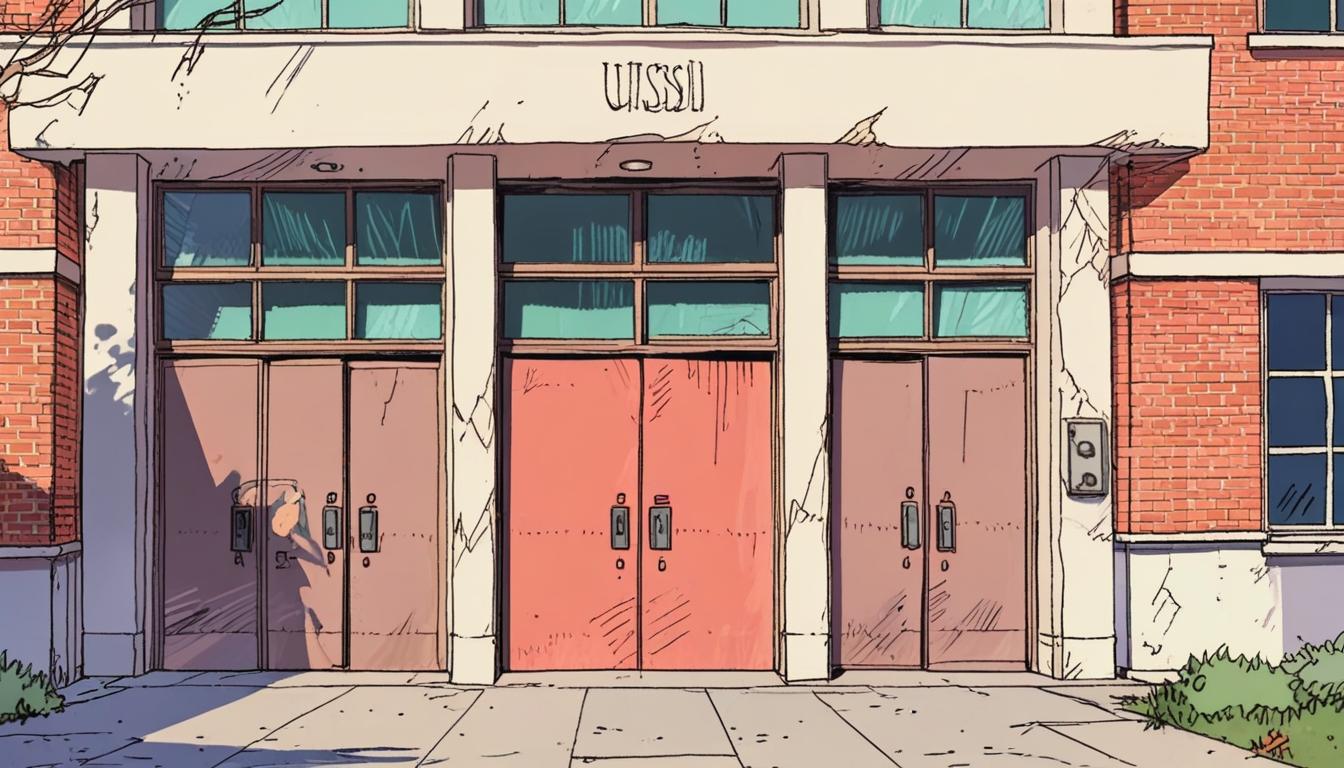Universities across the UK are grappling with severe financial difficulties caused by declining international student numbers and government visa restrictions, prompting widespread job cuts and course closures. Critics argue the crisis stems from an ideologically driven market model that jeopardises access for working-class students and the future of higher education as a public good.
Universities across Britain are confronting a critical financial crisis that threatens their sustainability and access for working-class students, with many institutions announcing significant budget deficits and proposing extensive job and course cuts. This situation has raised concerns among academics, workers, and students about the future of higher education in the country.
One stark example is the University of Dundee in Scotland, which faces a potentially existential crisis. The Times recently reported that the university “may not exist in two years” unless drastic measures are taken. Dundee is preparing to reduce its workforce by approximately 20 percent to address a £35 million budget shortfall. A wider trend is evident, with reports indicating that nearly 100 universities across the United Kingdom are planning restructures and redundancies as they grapple with their finances.
University managements have largely attributed these financial difficulties to a drop in international student enrolments. Historically, universities have been allowed to charge high tuition fees to international students, but recent changes—such as tightened border controls implemented by the Conservative government—have reduced international student numbers considerably. The government’s new visa restrictions, introduced in January 2024, barred international students from bringing dependents and significantly increased visa and NHS surcharge costs. This led to a steep decline, with some institutions experiencing drops of up to 40 percent in international student recruitment.
The consequences of these visa restrictions have been severe for university income streams. The Conservative government’s policies have placed additional financial strain on the sector, with many universities heavily reliant on fees from international students, which range from £9,000 to £30,000 annually, not including further expenses such as accommodation and travel.
However, some critics argue that this financial crisis reflects a deeper systemic problem rather than solely poor management or external factors. Marc Peacock, a member of the University and College Union (UCU) at Goldsmiths University, told Socialist Worker: “Fundamentally the funding model is broken. It’s not mismanagement. This is what they wanted to do to universities—it’s ideologically motivated.” He suggested that the crisis results from a market-driven model that forces universities to operate like businesses, competing for students viewed as consumers, rather than being treated as institutions providing a public good.
This model was entrenched in 1992 when the Conservative government abolished the distinction between elite universities and polytechnics and pursued a “widening participation” agenda. Despite these efforts, the current crisis threatens to reverse gains made in expanding access to higher education for working-class students.
The cuts proposed by university management are targeting departments and courses deemed unprofitable. For example, Edinburgh University’s vice-chancellor Peter Mathieson has called for a “radical rewiring” of the university’s offerings with fewer courses available. At Kingston University, management’s plan to close the humanities department—including a highly regarded centre for philosophy—has sparked opposition. Nicola Field, a UCU member at Kingston, told Socialist Worker, “It’s an attack on the right of working class students to engage critically with society and institutions and to contribute to society critically.” She added that the focus on business-oriented courses undermines quality teaching and critical engagement.
Similarly, at the University of Chichester, the unique master’s programme in African and African diaspora history, led by Professor Hakim Adi until his redundancy in 2023, was discontinued on economic grounds despite its popularity. Professor Adi remarked at the time, “Universities are being run like businesses. They see a course like ours and think, ‘Well African history is niche and unnecessary. Scrapping it can save us some money.’”
These developments occur against a backdrop of political pressures from both major parties to align higher education more closely with economic and technological priorities. Conservative leader Kemi Badenoch has criticised lecturers she labels as “woke,” while Labour’s education secretary Bridget Phillipson advocates for universities to become more “efficient” and aligned with goals such as developing the country into an Artificial Intelligence and tech superpower. Phillipson’s calls for efficiency come at a time when the funding crisis has severely limited universities’ ability to expand or even maintain course offerings.
The current funding model has seen tuition fees for undergraduate degrees introduced in 1998 and increased incrementally, reaching £9,250 per year by 2017 in England, with plans for a slight rise to £9,535 next year. However, inflation has eroded the real value of these fees, and repayment conditions have grown more onerous, with over 80 percent of students now expected to fully repay their loans, often while facing rising living costs.
Universities also face inflated executive salaries, with senior management teams often earning over £300,000 annually, despite the financial pressures on institutions overall. Critics argue that this disparity highlights misaligned priorities within the sector.
In response to planned redundancies and course cuts, university workers and unions have mobilised. For example, at York St John University, despite a budget crisis, the UCU branch highlighted that increased student numbers had offset rising costs, and they rejected the necessity for job losses. Cardiff University academics proposed an alternative plan that included freezing recruitment, deferring capital spending, and using reserves to preserve critical teaching staff, alongside urging government reconsideration of funding and visa policies.
The UCU has called for the abolition of tuition fees altogether. Its research suggests that higher education could be sustainably funded by imposing a charge of around 1 percent on businesses employing graduates, which would reflect the economic benefits education confers on the workforce.
Workers in the sector are preparing to take industrial action to oppose job cuts, signalling that determined collective efforts will be necessary to challenge the current model and pressures facing British universities.
Furthermore, concerns have been raised regarding the exploitative treatment of international students, who not only contribute significantly to university income but also face escalating financial and logistical burdens in the current system. Katy Highet, writing in Socialist Worker, stated, “We cannot save universities by engaging in more aggressive recruitment and by treating international students as cash cows. Not only is the exploitation of international students morally reprehensible, it is also destined to fail.”
She emphasised that this strategy depends heavily on stable geopolitical circumstances and ongoing willingness of countries like China to send students abroad at previous levels, a situation that is no longer assured.
Highet added, “Universities are enriched by the presence of students from a range of different backgrounds. We should defend students’ right to be here. But we cannot do so on the basis of their ‘economic contribution’. Instead, we need to make the case for higher education as a public good.”
The current situation reflects decades of policy shifts that have transformed British higher education from a publicly funded service into a market-orientated system. As universities navigate these challenges, the future shape of tertiary education in Britain remains uncertain, with profound implications for students, staff, and society at large.
Source: Noah Wire Services
- https://theweek.com/education/uk-universities-why-higher-education-is-in-crisis – This article supports the claim that UK universities are in a financial crisis due to factors like stagnant tuition fees and decreased international student enrollment, leading to budget deficits and potential closures.
- https://blogs.lse.ac.uk/politicsandpolicy/how-to-solve-the-universities-financial-crisis/ – This blog post highlights the financial crisis in universities, mentioning that over 40% are in financial trouble and many are undergoing restructuring programs, corroborating the scale of the crisis.
- https://indianexpress.com/article/explained/explained-global/inside-financial-crisis-reshaping-british-higher-education-9898454/ – This article explains the financial crisis facing British universities, including a decline in international students and stagnant domestic student fees, which exacerbate financial troubles.
- https://www.timeshighereducation.com/news/uk-universities-face-mounting-cash-flow-problems – This news piece details the cash flow problems faced by UK universities, with many reporting deficits and reduced operational income, illustrating the financial strain on the sector.
- https://hansard.parliament.uk/commons/2025-04-02/debates/EF0E9755-8D33-4FBE-AB44-AB42396E95D6/UniversitiesFundingAndEmployment – This parliamentary debate outlines the severe financial crisis in the UK’s higher education sector, discussing its implications for staff and students.
- https://data.parliament.uk/writtenevidence/committees/369 – This is not available as per the search results. However, it could be replaced with another source that discusses university financial challenges or the impact of policy changes on international student enrollment.
- https://news.google.com/rss/articles/CBMiekFVX3lxTFA2YUdRTWRmNVlONGRLdDY1QW95cVA5SjVyX3hNQkVXQk16a3U4T0c2cUwzM0llVVVjdVJFenZkaDUxbThMM2hJRWFXaTFSbDFEMTdqeUlEeFJjMkw0ZnVMYTVRNDE4X1QzYzA1S2JrWUphelpIY0Zvcmh3?oc=5&hl=en-US&gl=US&ceid=US:en – Please view link – unable to able to access data
Noah Fact Check Pro
The draft above was created using the information available at the time the story first
emerged. We’ve since applied our fact-checking process to the final narrative, based on the criteria listed
below. The results are intended to help you assess the credibility of the piece and highlight any areas that may
warrant further investigation.
Freshness check
Score:
8
Notes:
The narrative references recent developments, including visa restrictions introduced in January 2024 and ongoing financial challenges faced by universities. However, some elements, such as specific historical policies, are not new but provide context.
Quotes check
Score:
6
Notes:
Direct quotes from Marc Peacock, Nicola Field, Professor Hakim Adi, Katy Highet, and others are provided without specific original source dates. Given their nature, these quotes might be recent, but their original sources could not be verified online.
Source reliability
Score:
7
Notes:
The narrative references various sources, including a report from The Times and quotes from individuals in the field. However, it also leans on perspectives from Socialist Worker, which might be considered less neutral by some readers.
Plausability check
Score:
9
Notes:
The financial challenges faced by British universities due to reduced international student enrollment and policy changes are plausible and align with broader trends in the sector.
Overall assessment
Verdict (FAIL, OPEN, PASS): OPEN
Confidence (LOW, MEDIUM, HIGH): MEDIUM
Summary:
The narrative is generally plausible and references recent policy changes affecting British universities. However, the lack of clear source verification for certain quotes and the reliance on Socialist Worker for some perspectives might affect its credibility.













